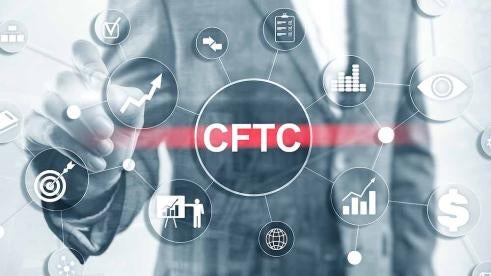Highlights
-
An entity that is simply providing signal aggregation should not need to register as a commodity trading advisor (CTA) with the Commodity Futures Trading Commission (CFTC)
-
The recent CFTC order requiring a trade signal platform to register as a CTA seems to stem out of the facts and circumstances of the specific case
-
Further clarification is needed to identify components triggering CTA requirements; the precise facets for integrations between trade signal and trade data platforms and commodity trading providers remain unclear
The Commodity Futures Trading Commission (CFTC) recently entered into a consent order for permanent injunction against defendants Ryan Masten and BareIt Media LLC (d/b/a SignalPush) relating to a September 2020 CFTC enforcement action regarding the marketing, sale, soliciting, fraud, trade execution, and promises of “quick returns” offered on certain websites.
While a seemingly unremarkable enforcement action and complaint, the resulting industry commentary on the impact of certain CFTC statements about trade signaling and commodity trading advisors (CTA) in the Aug. 29 order has raised questions for fintech vendors who enjoyed certainty in their offerings.
Historically, software providers that allow traders to aggregate signal information have not had to register as CTAs, but the two-paragraph description of prohibited activity in the CFTC’s consent order suggests a change in policy requiring providers to register.
A more thorough understanding of the activity in which SignalPush was engaged suggests the CFTC’s imposition of CTA registration requirements on the Defendants actually resulted from their provision of other marketing, sales, soliciting, fraud, and integrations with unregistered providers—meaning an entity that is simply providing signal aggregation software would not need to register as a CTA.
What Is Considered a CTA?
A CTA is defined as “an individual or organization that, for compensation or profit, advises others, directly or indirectly, as to the value of or the advisability of trading futures contracts, options on futures, retail off-exchange forex contracts or swaps.” In contrast, a trade signal is simply a trading indicator and/or trading trigger derived from price movements or graphical trading movements. Often, as with the defendants in this case, trade signals are built into trading platforms and websites supporting certain integration with industry participants to display trading data and connect users to accounts hosted at registered CFTC market participants. These technology systems are often called trading screens.
Traditionally, technology platforms have not been considered CTAs when providing aggregated and automated trade signal information and linking users to certain registered CFTC market participants.
CFTC’s Consent Order Against SignalPush
The recent consent order states that the defendants, “offered customers and potential customers the ability to obtain trade signals and to automate trading on binary options platforms using those trade signals.” The order goes on to state that the defendants operated as CTAs by, “for compensation or profit, engaging in the business of advising others, either directly or through publications, writing, or electronic media, as to the value or advisability of trading in any commodity option, and failed to register as such, in violation of [the Commodity Exchange Act].”
While the order does not directly define the particular trade signal activities alone as sufficient to cause the platforms to be deemed CTAs or to create a particular registration obligation, CFTC Commissioner Caroline Pham issued a notable dissenting statement, saying “the [CFTC] seems to be once again changing its interpretation of the definition of a ‘commodity trading advisor’ (CTA) in an enforcement action without sufficient explanation and without the opportunity for the public to comment.”
Recent Commentary
Citing the 2015 Nadex Advisory Notice, Commissioner Pham noted that, “a technology provider that sells software capable of receiving and aggregating trade signals, and submitting orders to the Exchange based upon those signals and parameters customized by the trader is not likely required to register with the CFTC as the trade advice does not originate from the technology provider.”
Commissioner Pham went on to further clarify the industry’s interpretation of the recent order as forcing trade signal providers to register as CTAs with the CFTC by stating, “for the first time since the Nadex Advisory Notice, the Commission is changing this interpretation because the [Defendants’] Consent Order may be construed to require technology providers that do not originate trade signals to nonetheless register as CTAs.” However, given the complex nature of the charges contained in the 2020 complaint and the overall activity of SignalPush in the market, it appears more likely the CFTC viewed SignalPush to be more than just a software service provider.
This case seems to involve much more than just the provision of technology that allowed for trading signal aggregation. As the complaint stated, “On the SignalPush website, BareIt and Masten represented that they had ‘interview[ed]’ potential signal providers to gain information about ‘their strategies, amount of clients, [and] money management,’ reviewed six months of performance records and required ‘the potential provider submit certain legal documents’ before approving them. Upon information and belief, each of these representations was false.” As an internet-based review of SignalPush indicated, “SignalPush is not a signal service, it is a platform for signal services, gurus and social traders to market themselves and their product.” The review goes on to state, “SignalPush is a binary options social and automated copy trading platform that can link with a number of top brokers and be used to manage your account.”
In short, SignalPush’s activity was a far cry from traditional technology trade data systems, like those referenced by Commissioner Pham and other industry commenters. Such traditional systems aggregate trading “triggers,” suggesting optimal timing for purchasing or selling commodities and then linking traders who want to use those signals to registered exchanges. In sharp contrast, SignalPush purported to provide traders with access to advisors as well as an unregistered exchange. Effectively, SignalPush and its principal were assisting to perpetuate a fraud in concert with other unregistered participants.
Takeaways
This case is unlikely to be effective precedent for suggesting that traditional technology providers that allow traders to aggregate trading signals must register as CTAs.
Until the CFTC indicates that rules changes are in process and/or establishes finding against a traditional trade signal aggregator, it is unlikely that the CFTC intends to make the CTA definition broader than its existing application.
For additional information on CFTC terminology, please see, the CFTC Futures Glossary.






 i
i


